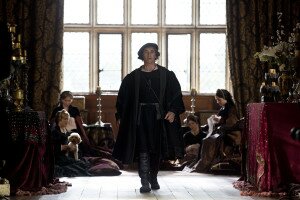The bulk of the praise about to be and already heaped on PBS’ absorbing production of “Wolf Hall,” Sunday on “Masterpiece theater,” belongs to Mark Rylance’s cautiously clever and cunning Thomas Cromwell, one of the most powerful advisors of King Henry VIII played by Damian Lewis.
 His allegiance to his prince – the cardinal and father figure played by Jonathan Pryce – wins him the admiration and confidence of the King for whom Cromwell becomes a facilitator in the war against a church and a pope who refuse to allow the king a divorce.
His allegiance to his prince – the cardinal and father figure played by Jonathan Pryce – wins him the admiration and confidence of the King for whom Cromwell becomes a facilitator in the war against a church and a pope who refuse to allow the king a divorce.
“The King wants a son” and has decided that “some sin committed” by his wife, the barren queen Katherine of Aragon, is responsible for her failing to produce one.
The King has a young new queen in waiting, Anne Boleyn, and Cromwell is given the task at which the cardinal failed at: balancing the interests of the 16th century’s most powerful personalities with his own, amidst the labyrinth machinations of the royal court, and keeping his head in the process.
With his guarded personality and impassive expression Cromwell is the consummate politician. He is a man of few words, but those he speaks cut to the heart of whatever matter, or person, like a scalpel.
The six part miniseries is based on Hilary Mantel’s Booker Award winning historical novels “Wolf Hall” and “Bring Up the Bodies,” the first two books in an announced trilogy.
Rylance, 55, an acclaimed stage actor who was born in England and moved to the Milwaukee area in 1969. His father taught at University School, and Rylance appeared in stage productions while a student there. He later performed with the Royal Shakespeare Company and was director at Shakespeare’s Globe. He won a leading-actor Tony Awards for “Boeing-Boeing,” “Jerusalem” and “Twelfth Night.”
Mantel’s novels were adapted by Peter Straughan, the Oscar nominated screenwriter of the similarly intricate adaptation of John LeCarre’s Cold War novel “Tinker Tailor Soldier Spy.”
And director Peter Kosminsky portrays the period with passion and precision. Its production values make “Downton Abbey” look like “The Brady Bunch.” There is little pomp but substantial circumstance.
In a society only lighted by sun, candles and fireplace – or not at all – the dousing in a room of one burning taper at a time is a slow dance in the formal choreography of a lost world and another time. Cromwell was shaped by this world and reshapes it in his image, while appearing to do nothing.
“You know what you’re doing I suppose,” says his less ambitious wife. “Or look like you do.”
Cromwell is masterfully personified by Rylance, for whom a raised eyebrow, scowl or frown are physical manifestations of the wheel within wheels spinning in Cromwell’s head and the emotions he will not display, even after tragedy strikes his family or confronting his abusive blacksmith father.
And his scenes jousting with Lewis, who starred on “Homeland,” are filled with the tension of truth being spoken to power.
Posted by